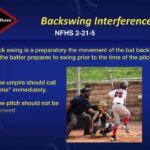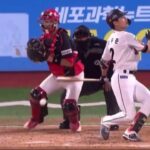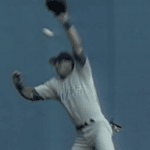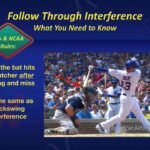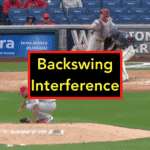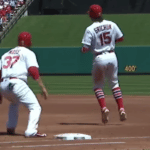NCAA 6-2 Immediate Dead Ball—Runners Return
Immediate Dead Ball—Runners Return
SECTION 2. The ball becomes dead and base runners return when:
a. A foul is hit that is not caught. Runners return and the umpire shall not put the ball in play until all runners have retouched their bases;
b. A ball is illegally batted (see 1-12-b PENALTY and 7-10);
c. A coach intentionally interferes with a thrown ball (see Rule 2 – Interference and 8-3-j);
d. If a batter swings and misses a pitch and carries the bat all the way around and, in the umpire’s judgment, unintentionally hits the catcher or the ball in back of him on the backswing, it shall be called a strike only (not interference). The ball will be dead, however, and no runner shall advance on the play.
1) If the follow-through hits the catcher and occurs in a situation where the batter normally would become a runner because of a third strike not held by the catcher, the ball shall be dead and the batter declared out. No runner shall advance.
2) If the catcher is in the act of making a throw to retire a runner and the batter is in the batter’s box and his normal follow-through unintentionally strikes the catcher or the ball while the catcher is in the act of throwing, “Time” is called and runners return (unless the catcher’s initial throw retires the runner).
e. A fair ball touches a runner in fair territory before touching any infielder including the pitcher or an umpire and before passing an infielder (other than the pitcher) who has a chance to make a play on the ball. The runner who is touched by the fair ball is out, and no other runner may advance or score, except when forced.
Note: If a fair ball goes through or by an infielder and touches a runner immediately in back of him or touches the runner after having been deflected by any fielder including the pitcher, the umpire shall not declare the runner out for being touched by a batted ball. In making such a decision, the umpire must be convinced that the ball passed through, or by, the infielder and that no other infielder had a chance to make a play on the ball.
PENALTY for e.—The ball is dead and the runner hit by the batted ball is declared out. The batter is awarded first base with a single. Remaining runners advance if forced.
f. A fair ball touches an umpire before touching a fielder and before passing a fielder other than the pitcher;
PENALTY for f.—The ball is dead and the batter is awarded first base with a single. Runner(s) advance if forced. Note: If a fair ball touches an umpire after having passed a fielder other than the pitcher, or having been touched by a fielder, including the pitcher, the ball is in play.
g. Interference is called on another runner; or Note: If the umpire declares the batter, batter-runner or a runner out for offensive interference, all other runners shall return to the last base that was legally attained at the time of the interference.
h. If any runner intentionally interferes with a batted or thrown ball with a helmet or other personal equipment, the ball is dead, the runner is out, and any runner in advance of the interference shall return to the base last occupied at the time of interference. The batter-runner is awarded first base.
i. If a fielder reaches into a dugout, bullpen or dead-ball area to catch a foul fly ball and an opponent interferes with the attempted catch, the batter shall be declared out and no runners shall advance

